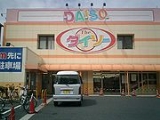
100-yen shop
Encyclopedia
100 Yen Shops are common Japanese
shops
in the vein of American
dollar stores. Stocking a variety of items from clothing to stationery, housewares to food, each item is priced at precisely 100 yen. A recent variation of the 100 Yen Shops are 99 Yen Shops. Daiei
also operates 88 Yen stores. Some shops, such as SHOP99, specialize in certain items, such as groceries or natural goods, but this is less common than the variety store model. The current Japanese sales tax
of 5% is also added, making a 100 Yen purchase actually cost 105 Yen.
One supporter of 100 Yen Shops is Hirotake Yano, the founder of Daiso
Industries Co. Ltd., which runs "The Daiso" chain. The first store opened in 1991, and there are now around 1,300 stores throughout Japan. This number is increasing by around 40 stores per month. One of the largest 100 Yen Shops is the Daiso in the Harajuku neighborhood of Tokyo. It spans four stories and over 10500 square feet (975.5 m²). Larger still is the five story Daiso Giga Machida in front of Machida Station, Tokyo.
Similar shops have opened around other parts of Asia
as well, some of them operated by Japanese companies such as Daiso
. In Hong Kong
, department stores have opened their own 10-dollar-shops (JPY140) to compete in the market, and thus there are now "8-dollar-shops" (JPY110) in Hong Kong, in order to compete with lower prices.
100 Yen Shops are able to keep prices down by purchasing goods internationally and in bulk. These goods come from countries with lower production costs, such that 100 Yen Shops may retail them for far less than the merchandise is worth.
Japan
Japan is an island nation in East Asia. Located in the Pacific Ocean, it lies to the east of the Sea of Japan, China, North Korea, South Korea and Russia, stretching from the Sea of Okhotsk in the north to the East China Sea and Taiwan in the south...
shops
Retailing
Retail consists of the sale of physical goods or merchandise from a fixed location, such as a department store, boutique or kiosk, or by mail, in small or individual lots for direct consumption by the purchaser. Retailing may include subordinated services, such as delivery. Purchasers may be...
in the vein of American
United States
The United States of America is a federal constitutional republic comprising fifty states and a federal district...
dollar stores. Stocking a variety of items from clothing to stationery, housewares to food, each item is priced at precisely 100 yen. A recent variation of the 100 Yen Shops are 99 Yen Shops. Daiei
Daiei
, based in Kobe, is one of the largest supermarket chains in Japan. In 1957, Isao Nakauchi founded the chain in Osaka near Sembayashi Station on the Keihan train line. Daiei is now under a restructuring process supported by Marubeni Corporation and ÆON Co., Ltd., another Japanese supermarket chain....
also operates 88 Yen stores. Some shops, such as SHOP99, specialize in certain items, such as groceries or natural goods, but this is less common than the variety store model. The current Japanese sales tax
Sales tax
A sales tax is a tax, usually paid by the consumer at the point of purchase, itemized separately from the base price, for certain goods and services. The tax amount is usually calculated by applying a percentage rate to the taxable price of a sale....
of 5% is also added, making a 100 Yen purchase actually cost 105 Yen.
One supporter of 100 Yen Shops is Hirotake Yano, the founder of Daiso
Daiso
is the largest franchise of 100-yen shops in Japan owned by . Daiso has a range of over 100,000 goods, of which over 40 percent are imported goods, many of them from China. Many of these are own-brand goods....
Industries Co. Ltd., which runs "The Daiso" chain. The first store opened in 1991, and there are now around 1,300 stores throughout Japan. This number is increasing by around 40 stores per month. One of the largest 100 Yen Shops is the Daiso in the Harajuku neighborhood of Tokyo. It spans four stories and over 10500 square feet (975.5 m²). Larger still is the five story Daiso Giga Machida in front of Machida Station, Tokyo.
Similar shops have opened around other parts of Asia
Asia
Asia is the world's largest and most populous continent, located primarily in the eastern and northern hemispheres. It covers 8.7% of the Earth's total surface area and with approximately 3.879 billion people, it hosts 60% of the world's current human population...
as well, some of them operated by Japanese companies such as Daiso
Daiso
is the largest franchise of 100-yen shops in Japan owned by . Daiso has a range of over 100,000 goods, of which over 40 percent are imported goods, many of them from China. Many of these are own-brand goods....
. In Hong Kong
Hong Kong
Hong Kong is one of two Special Administrative Regions of the People's Republic of China , the other being Macau. A city-state situated on China's south coast and enclosed by the Pearl River Delta and South China Sea, it is renowned for its expansive skyline and deep natural harbour...
, department stores have opened their own 10-dollar-shops (JPY140) to compete in the market, and thus there are now "8-dollar-shops" (JPY110) in Hong Kong, in order to compete with lower prices.
100 Yen Shops are able to keep prices down by purchasing goods internationally and in bulk. These goods come from countries with lower production costs, such that 100 Yen Shops may retail them for far less than the merchandise is worth.

